 KIGALI-Two strong earthquakes shook the African Great Lakes region on Sunday, killing at least 40 people in Rwanda and the Democratic Republic of Congo and injuring hundreds more, according to officials and hospital sources.The two quakes struck close together along the western Rift Valley fault cracking open the walls of houses and buildings in the DR Congo city of Bukavu, near the epicentre of the first quake which measured 6.0 on the Richter scale.People ran out of churches packed for Sunday mass as the walls shook.Thirty-four people were killed in Rwanda, local government minister Protais Musoni, said and at least six in DR Congo, according to officials there.Ten people were killed when a church collapsed in the Rusizi district of Rwanda's Western Province and 13 others died in Rusizi and Nyamesheke districts, Radio Rwanda reported.Some 250 injured were transported to various regional hospitals. A witness in Rusizi said public buses were commandeered to carry the casualties, the radio reported.Rwandan minister Musoni said that the provincial governor was on site and that the police and army were helping with rescue operations."Rescue operations are continuing to try to pull people out of the ruins of their houses," he said.Across the border in DR Congo, the quake struck at 0734 GMT some 20 kilometres (12 miles) north of Bukavu, while a second quake of 5.0 magnitude was recorded at 1056 GMT, Francois Lukaya of the Goma volcanological observatory in Nord-Kivu told AFP. The eruptions killed six people and wounded another 200, the United Nations peacekeeping mission MONUC said, offering help to quake victims. Bukavu's mayor put the figure at five dead.The town's hospitals were caring for dozens of wounded, medical officials said.Those dead included a day worker at the mission's office in Bukavu, where a crisis committee had been established, the UN added in a statement."MONUC is participating in the committee and wants to raise awareness to encourage the populations not to return to their homes immediately, since they've been weakened by the jolts," MONUC spokesman Kemal Saiki said from Kinshasa."People are panicking so much they're afraid to return home. They're afraid of being surprised by aftershocks and prefer to stay outside," a Rusizi resident told AFP.In the DR Congo town of Kabare, north of Bukavu, the walls of a church collapsed on the congregation during the mass, injuring 37, five seriously, priest Leon Shamavu told AFP by telephone.The quakes were also strongly felt in neighbouring Burundi, south of Rwanda, Francois Lukaya, a scientist at the Goma observatory in North Kivu told AFP.All Burundian hydroelectric dams stopped, causing a half-hour power cut, a water authority official said.The quake and its aftershocks also shook the Burundian capital, Bujumbura, around 120 kilometres (75 miles) south of its epicentre."I felt a very strong shock shake my house. The walls shook really hard," a resident of Bujumbura told AFP.[[[[The first quake was one of the "biggest earthquakes ever recorded in the Kivu region," Lukaya told AFP. ]]]]A powerful 6.8 magnitude earthquake rocked the region in December 2005 but, while it is prone to seismic activity, it has mostly escaped major quake damage in recent years.
KIGALI-Two strong earthquakes shook the African Great Lakes region on Sunday, killing at least 40 people in Rwanda and the Democratic Republic of Congo and injuring hundreds more, according to officials and hospital sources.The two quakes struck close together along the western Rift Valley fault cracking open the walls of houses and buildings in the DR Congo city of Bukavu, near the epicentre of the first quake which measured 6.0 on the Richter scale.People ran out of churches packed for Sunday mass as the walls shook.Thirty-four people were killed in Rwanda, local government minister Protais Musoni, said and at least six in DR Congo, according to officials there.Ten people were killed when a church collapsed in the Rusizi district of Rwanda's Western Province and 13 others died in Rusizi and Nyamesheke districts, Radio Rwanda reported.Some 250 injured were transported to various regional hospitals. A witness in Rusizi said public buses were commandeered to carry the casualties, the radio reported.Rwandan minister Musoni said that the provincial governor was on site and that the police and army were helping with rescue operations."Rescue operations are continuing to try to pull people out of the ruins of their houses," he said.Across the border in DR Congo, the quake struck at 0734 GMT some 20 kilometres (12 miles) north of Bukavu, while a second quake of 5.0 magnitude was recorded at 1056 GMT, Francois Lukaya of the Goma volcanological observatory in Nord-Kivu told AFP. The eruptions killed six people and wounded another 200, the United Nations peacekeeping mission MONUC said, offering help to quake victims. Bukavu's mayor put the figure at five dead.The town's hospitals were caring for dozens of wounded, medical officials said.Those dead included a day worker at the mission's office in Bukavu, where a crisis committee had been established, the UN added in a statement."MONUC is participating in the committee and wants to raise awareness to encourage the populations not to return to their homes immediately, since they've been weakened by the jolts," MONUC spokesman Kemal Saiki said from Kinshasa."People are panicking so much they're afraid to return home. They're afraid of being surprised by aftershocks and prefer to stay outside," a Rusizi resident told AFP.In the DR Congo town of Kabare, north of Bukavu, the walls of a church collapsed on the congregation during the mass, injuring 37, five seriously, priest Leon Shamavu told AFP by telephone.The quakes were also strongly felt in neighbouring Burundi, south of Rwanda, Francois Lukaya, a scientist at the Goma observatory in North Kivu told AFP.All Burundian hydroelectric dams stopped, causing a half-hour power cut, a water authority official said.The quake and its aftershocks also shook the Burundian capital, Bujumbura, around 120 kilometres (75 miles) south of its epicentre."I felt a very strong shock shake my house. The walls shook really hard," a resident of Bujumbura told AFP.[[[[The first quake was one of the "biggest earthquakes ever recorded in the Kivu region," Lukaya told AFP. ]]]]A powerful 6.8 magnitude earthquake rocked the region in December 2005 but, while it is prone to seismic activity, it has mostly escaped major quake damage in recent years.As in the days of Noah......

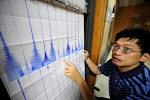
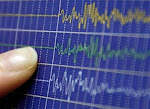
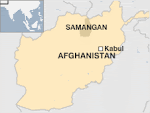







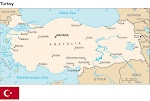
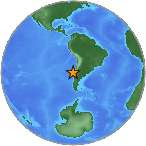




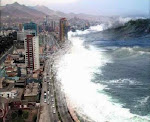

.jpg)


.bmp)
No comments:
Post a Comment